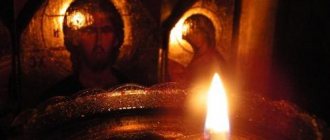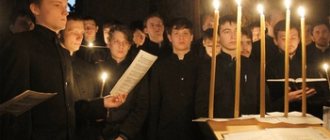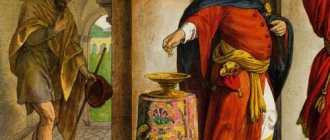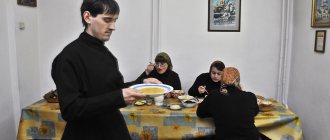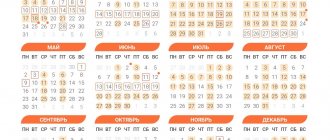THE MEANING OF GREAT LENT AND ITS ROLE IN THE LIFE OF A BELIEVER
The meaning of Lent is spiritual cleansing and preparation for the Christian holiday of Easter and the resurrection of Christ. In the modern world, where the power of the money bag has long outweighed the power of spiritual cleansing of a person, Lent has turned into a formality, observance of which provides some protection and awareness of the correctness of one’s behavior. This also happens because the understanding of Lent comes down to the rejection of lean foods and does not affect the deep spiritual spheres of a person.
Lent is associated with the number 40: for so many days the Savior was in the desert, exposed to the devil's temptation and fasting. These 40 days are called Pentecost - the main period of fasting, to which the Saturday of Lazarus and Palm Sunday as well as Holy Week were later added. It turned out to be Pentecost.
The duration of Lent is six weeks (weeks), with the addition of Holy Week, which covers the period from the beginning of February (no earlier than the 2nd) to the beginning of May (no later than the 7th). The date depends on the day of Easter.
Any fast is a path to God. Initially it had the meaning of preparation for Baptism. Previously, only pagans fasted who were planning to convert to Christianity and prepared for this rite by cleansing themselves of old errors with the help of prayers, sermons and reading spiritual literature. It was a kind of sacrificial feat in the name of faith that prepared the body and soul for the acceptance of Christianity. In ancient times they were baptized on Christmas and on Easter before Easter on Holy Saturday. Showing their solidarity with the pagans, other Christians also accepted the conditions of Great Lent and began to fulfill all the sacrificial conditions due at this time. In those days, this only applied to Holy Week.
THE MEANING OF GREAT LENT IS IN THREE ASPECTS:
This is a sign of solidarity and unity among Christians. General obedience evokes a feeling of conciliarity and closeness of all people of the Orthodox world. Oppression of the flesh. Cleansing the soul from the shackles of the flesh, passions and temptations. The soul must stop depending on the body. Refusal of lean food (meat, milk, animal fats, eggs, confectionery products made with the addition of milk, fats and eggs). Spiritualization of man. Prayer, repentance, cleansing from evil thoughts, the reign of peace and love in the soul. Dialogue with God.
Lent is preceded by preparation, which begins 4 weeks before it and spiritually prepares the Orthodox for repentance. Each week is called differently and has its own purpose:
- Week about Zacchaeus. Calls for the free desire of a person to go to God. Zacchaeus, a small, sinful and limited man, overcomes his timidity and seeks the attention of Jesus Christ and brings him to his home. This is how his irresistible desire to be closer to the divine light of truth is manifested.
- Week of the Publican and the Pharisee. At this time, they remember the parable of the publican and the Pharisee, each of whom came to the temple to pray, but one (the publican) as a repentant sinner, and the other (the Pharisee) as exalting himself. The meaning of this week is sincere repentance, and not ostentatious, performed for the sake of one’s own pride and greatness. God forgave the sincerely repentant publican, but condemned the Pharisee who fulfilled all the canons, but was overwhelmed by pride. As a sign that sincere rather than ostentatious repentance is more important, fasting is not observed at this time; it is allowed to eat cheese, eggs, and meat.
- Week of the Prodigal Son. A well-known parable calls on the lost to return to the truth, as did the son who squandered his father’s fortune, died and came to life, was lost and was found.
- Week of the Last Judgment. Dedicated to the fall of Adam and Eve and their expulsion from Paradise, as well as the future Last Judgment. Sunday of this week is the last day before Lent, when Orthodox Christians eat meat.
The week following this week is called Meat Week, it is called Maslenitsa week. According to the Typikon code, this week you can eat fish, dairy products and eggs. The last Sunday of this week is Forgiveness, the rite of forgiveness is performed and Lent begins.
Speaking figuratively, Lent is the time when a person goes to God. He is helped in this by fasting, prayer and repentance, and Holy Week is the path of God to man, coming through suffering, Golgotha, hell and Easter Resurrection. Pentecost is the path to Easter, and on the way there is less divine service, therefore the liturgy is not served (only on Saturdays and Sundays). Only on Wednesday and Friday is communion possible, but with gifts that were consecrated earlier. There is a special atmosphere in the church at this time.
The essence of Lent
As John of Damascus said: “If fasting was all about food, then cows would be able to enter the Kingdom of Heaven.” There is another proverb, better known among the people: “I didn’t eat meat all through Lent, but I ate my neighbor.” So what is fasting for Orthodox Christians? Just a food restriction or something more?
John Chrysostom said: “Not only the mouth should fast, - no, let the eye, the ear, and the hands fast...” This means that, first of all, a person must limit himself in something on a spiritual level:
- remove yourself from evil;
- curb your tongue;
- put aside anger;
- tame lust;
- stop slandering and lying.
Many people far from the Church say exactly this when they justify their reluctance to fast physically. It's not about food - first you need to think about the soul. If it’s so hard to give up meat, then it’s so hard to give up meat, then from discussing your neighbor, condemning your boss, blaming your husband, and even more so. So it turns out that no fasting is observed at all - neither physical nor mental. And John Chrysostom calls to be merciful, meek and kind, long-suffering, merciful. It is under these conditions that God can accept Lent and reward for repentance.
FAQ
Many believers who decide to fast often have questions regarding restrictions during this period. The most common of them:
- Are children baptized during Lent? – Baptism is allowed on all days of the year.
- Are weddings allowed? – The sacrament of weddings is not performed during fasting, so you can only register an official marriage in a state institution, and get married after the end of fasting.
- How to celebrate birthdays? – It is recommended to refrain from noisy gatherings, dancing, and drinking strong alcoholic beverages. You can simply sit with your family and congratulate the birthday person.
- What to do if there are no Lenten dishes at the party? – In such cases, it is allowed to eat a little forbidden food, but the next day it is advisable to impose stricter restrictions on yourself.
- Is it possible to remember the dead? – Daily commemoration of the deceased in private is permitted. The Church commemorates the dead on Saturdays and Sundays.
- Is reading secular literature allowed? – There are no special prohibitions, but it is recommended to pay more attention to reading books with spiritual content.
Lent is a sacrifice to God and an opportunity to test oneself. By limiting himself to small things, a Christian acquires something more important, bringing him closer to the Lord.
History of Lent
The history of Great Lent began with the death of God the Man. Remembering the suffering of Jesus, crucified for the sins of mankind, the first Christians began to fast on Easter Day for the Jews who nailed the Savior to the cross. The duration of the fast was 40 hours. Subsequently, the fast on the day of Easter itself was canceled, but before it it was extended.
There is an opinion that it was established by the apostles, but modern history refutes this assertion. The first mention of the term "Great Pentecost" appears at the beginning of the 4th century in the First Council of Nicaea. In 331, Athanasius the Great ordered the flock to observe the “Quentary Day” lasting 40 calendar days.
The number “40” was not chosen by chance. As already mentioned, Jesus Christ prayed for 40 days in the desert, and remained in the tomb for another 40 hours. But having once established the number “40,” Christians did not immediately arrive at what they have today.
Different practices were used in different places. Thus, in Rome of the 5th century, the duration of fasting was 6 weeks. But three of them were fasting, excluding weekends, and they were not consecutive to each other. In the East, fasting lasted 8 weeks, which, excluding weekends, made it possible to obtain the desired figure of 40 days. The weekends became fasting under the influence of the monks.
The duration of Lent is 48 days, which are called the “Four Days”. The last week, or rather 6 days before Easter - “Holy Week”.
They begin to prepare for Lent another 4 weeks, that is, weeks in advance. They remember not only the parables of the Savior, but also the most important Gospel events - the fall of the first people, their expulsion from paradise, the subsequent Last Judgment - the day when Orthodox Christians can taste meat. He is also called the “Great Meat Empty.” Then comes Cheese Week, better known as Maslenitsa.
Many people think that the week before Lent is created in order to properly eat fast foods, so to speak, to remember the taste before prolonged abstinence. In fact, you can no longer eat meat. Fish, dairy products, eggs are allowed
Wednesday and Friday, which are fast throughout the year, are observed, albeit in a special way - believers eat food only once a day - in the evening. Divine services these days are already similar to Lenten ones: the Divine Liturgy is not celebrated, they begin to read the repentant prayer of Ephraim the Syrian and bow down. Christians gradually enter Lent, asking for forgiveness from their loved ones on the last, so-called “Forgiveness” Sunday. With pure thoughts, a heart free from resentment and evil, they begin the “Four Days”.
Divine service
The prayers of Great Lent are distinguished by a repentant mood; at all services the repentant prayer of St. Ephraim the Syrian (c.) “Lord and Master of my life...”. During Great Lent, on Wednesdays and Fridays, as well as on Monday and Tuesday of Holy Week and on Thursday of the fifth week, the Liturgy of the Presanctified Gifts is celebrated (except for Good Friday); on Saturdays and on the sixth Sunday the Liturgy of John Chrysostom is celebrated; on other Sundays, as well as on Thursday and Saturday of Holy Week - the Liturgy of Basil the Great; Liturgy is not celebrated on Monday, Tuesday and Thursday.
In the first four days of Great Lent, the Great Canon of St. is read at Compline. Andrew of Crete (VIII century). Each Sunday of Lent has a special memory. On the first Sunday after the liturgy, the rite of the Triumph of Orthodoxy is performed, established in memory of the restoration of the veneration of icons in 842 in Byzantium. The second resurrection is dedicated to St. Gregory Palamas, archbishop of the city of Thessaloniki (modern Thessaloniki, Greece), Byzantine hesychast theologian (XIV century). The third Sunday, called the Week of the Cross, is dedicated to the veneration of the Cross (worship is performed from Sunday to Friday). The fourth Sunday is dedicated to St. John Climacus, abbot of the monastery of Mount Sinai, author of the “Ladder” (-7th centuries). On Thursday of the fifth week at Matins the canon of St. Andrew of Crete, and a canon is read in memory of St. Mary of Egypt and her life (which is why the entire service, which lasts several hours, was called “Standing of Mary of Egypt”). Saturday of the fifth week is dedicated to the remembrance of the deliverance of Constantinople from enemy invasions, in memory of which the Great Akathist to the Most Holy Theotokos is read (this day is called the Feast of the Praise of the Most Holy Theotokos or “Saturday of the Akathist”). The fifth Sunday is dedicated to St. Mary of Egypt, who labored in Palestine in the century. Saturday of the sixth week - “Lazarus Saturday” - is dedicated to the memory of the resurrection of Lazarus (see John II: 146). On the sixth Sunday the feast of the Entry of the Lord into Jerusalem is celebrated. The next, last week is called Holy Week. The texts of the services of Great Lent are contained in the Lenten Triodion.
Lent and the calendar: how the beginning of fasting is determined
The start date of Lent depends on Easter, which is transitory. It can start from February 2 (15) to March 8 (21), and last until March 21 (April 3) – April 24 (May 7). The calculation takes into account the lunar-solar calendar, taking into account the difference between the old and new styles.
The date of Easter celebration itself is established using “Easter” - a combination of calendar and astronomical rules, calculations, tables, as well as certain amendments. “Extreme” Easters are rare. The last time it was very early was in 2010 - April 4, and the latest was May 8 - in 1983.
Lent 2022 - what date does it start and end?
Lent in 2022 begins on March 7 ( Monday
) and lasts until April 23 (
Saturday
). It is the longest. Starts 7 weeks before Easter after Forgiveness Sunday.
How long does Lent last?
The pre-Easter fast did not always and not always have such a duration. Compliance with it for 40 days
(
Holy Pentecost
) and Holy Week became common in the Church after the 4th century.
Every year the timing of the fast is different. Because Easter does not have a specific date. And it is calculated according to established church rules.
Monday marks the beginning of the first week of Lent. It's called "Clean Monday".
At first this name was not a church name. On this day, it was customary to tidy up, transfer everyday life from the festive ( Maslenitsa)
) for Lenten.
How many days left until Lent 2022
What to eat during Lent
Many of those who are trying to join church life begin their “acquaintance” with Great Lent with food restrictions in the first and last week, and, if we speak correctly, then Holy Week.
Lent was originally quite strict. Then, as today, it is established by the Palestinian charter, called the Typikon. If we consider it in general terms, the main provisions boil down to:
Dry eating once a day in the evening from Monday to Friday. This means that to satisfy hunger you can use only those foods that have not been subjected to heat treatment. Meal food is excluded during Lent, so only fruits, vegetables, herbs, dried, soaked fruits, and gifts of nature can serve in this capacity.
Eating food with butter twice a day on weekends. It can be thermally processed, and therefore the menu includes various cereals, potatoes, etc.
Eating fish on certain holidays that fall during Lent. This is Palm Sunday, the Annunciation (provided that it does not fall on Holy Week).
If there is a holiday on a weekday, then the believer can afford boiled food with oil and wine. If the holiday falls on Wednesday or Friday, then oil is excluded. You are allowed to eat food once these days.
Lent for the laity
Not everyone can withstand such restrictions - it’s not even a matter of a special attitude or strength of faith. Today there are few absolutely healthy people. The majority, especially those who have crossed the threshold of maturity, have some kind of chronic disease, including the gastrointestinal tract. Doctors forbid them to eat once a day, and even dry eating. No priest will demand such “feats” from his flock. Most often, Church ministers meet people halfway, allowing various concessions.
Restrictions close to the Typikon are observed in monasteries - in all other religious institutions there are relaxations. Thus, in modern Orthodox literature there is no longer any mention of the number of meals. That is, a person can sit at the table as many times as he wants.
The first 2 days of Lent are the strictest and include fasting, as on Good Friday. But no one will condemn a person if he eats these days. As for the products themselves, restrictions apply only to meat, offal, fish, dairy and eggs. All the rest can be eaten. Today you can find recipes specially designed for Lent.
But even here, the priest can meet the layman halfway and allow him, for example, to eat dairy products. For some, physical fasting can be replaced by spiritual fasting. For example, a person can promise his confessor to pray more often, read the Gospel and Psalter every day, and help his neighbors by doing good deeds.
Often, concessions are made for children, allowing them to eat meat, but at the same time recommending limiting the time they spend at the computer, for example. All these issues are resolved individually together with your confessor.
How to prepare for Lent 2022 - the meaning of the weeks
On the eve of Lent, a person realizes that he has a physical and spiritual feat ahead of him. It is important to prepare for this test.
The Church begins in advance to set believers up for restrictions during strict fasting. For this there are 4 preparatory weeks before fasting. Below we will consider the meanings of each of them.
The Week of the Publican and the Pharisee
The parable says that the Pharisees put their faith and good works on display. Those around them respected them, considering them true believers.
One of the Pharisees in the temple began to thank God for the fact that he was not such a sinner as others, showing pride. His prayer was not accepted.
collector ( unrespected tax collector)
). Standing at the end of the temple, he sincerely repented, calling himself a sinner.
At services this Sunday, believers are reminded to humble their pride. And to be not only righteous yourself, but also to love your neighbor. Even if it is a sinner.
Week of the Prodigal Son
According to the parable, the youngest son of a rich man went to other countries and led a riotous life there.
Having spent all the money and endured hardships, he remembered his home. He returned there in repentance before God and his father, ready to become his worker.
The father held a celebration in honor of this event, believing that his son “was dead and came to life.”
During church hymns at services, Christians are compared to the prodigal son. On their behalf, repentance is offered and forgiveness is asked before the Heavenly Father.
Meat, or the week of the Last Judgment
We are talking about the second coming of Jesus. About the Last Judgment, at which the fate of people will be decided. God knows everyone's deeds.
As a consequence of their actions, some will be doomed to torment. And others are rewarded with eternal good life.
The prophecy of the Last Judgment makes you think about your way of life, about sinfulness and righteousness. People must remember to be responsible for the actions they commit.
Eating meat is still allowed this Sunday
.
And then ( until Easter
) a ban is imposed on its use.
Cheese week (Maslenitsa)
The week reminds us of the sin of Adam and Eve. Fasting and its saving power are praised. On Maslenitsa, pancakes are baked and entertainment events are held. On Forgiveness Sunday, Christians attend church.
Round dance around the scarecrow on Maslenitsa
There, during the service, they hear a reminder of the need for reconciliation with others. Everyone should be forgiven. At the same time, without leaving a single drop of annoyance even in the most hidden corners of the heart.
The preparatory weeks make people understand that sins distance a person from God, and virtues bring him closer to Him.
Before Great Lent it is good to confess and receive communion. Although there are no rules obliging you to do this. It is allowed to confess and receive communion during fasting.
Preparation for meat and other foods before Lent
The last day before fasting, when fasting is still allowed, is called the spell.
There are two of them before Lent:
- for meat ( on Meat Sunday
). - for other fast food products ( on Forgiveness Sunday
).
The meaning of abstinence during Lent
Fasting is a time for spiritual improvement, an opportunity to look into yourself and feel and see your sinfulness. When a person realizes this, he begins to treat others more favorably, forgive others for their weaknesses and sins, realizing that he is also spiritually weak.
Fasting helps people gain faith and gives them the opportunity to transform themselves, cut off everything unnecessary, and shed what is superfluous. A sort of worldly “husk” that prevents us from discerning the holiness, the purity that exists in every person, because God created him in his own image. Often old grandmothers come to confession and repent of the fact that, out of their weakness, they allowed themselves too much and ate a piece of meat. But God is waiting for the repentance of another, repentance for sins - false witness, envy, memory of malice, love of money, adultery, etc.
Having denied yourself food, it is easier to start prayer, you want to learn the law and the word of God, and you have a desire to help a loved one, to do a good deed. That is, the transformation of the soul begins with physical fasting. One cannot happen without the other.
Through abstinence, a person is cleansed, awakens to a new life, where there is no place for sin, but there is only joy from the consciousness of one’s participation in God. Therefore, a true believer never becomes sad or discouraged during Lent. On the contrary, he rejoices, awaits his arrival, because when, if not at this time, can one get even for a moment closer to the Kingdom of Heaven, feel the love of the Almighty - the creator and father of the omnipresent.
Church fasting: why, when and how we fast
1. Of course, no one can make any serious argument against the fact that fasting occupies a significant place in church teaching and piety. But at the same time, we cannot close our eyes to the position in which this institution now finds itself, to the place that fasting today occupies in the lives of believers, and to the problems arising in connection with it, both among pastors and theologians, and among many ordinary people. Christian.
Everything that we said in the chapter “Pros and Cons” allows us to notice that the difficulties cited by many believers and theological discussions about fasting concern the expediency and, above all, the possibility of observing fasting in our time - at least in that form and within the time frame that he accepted in the centuries-old Christian tradition. In this chapter we are trying to describe and analyze, as simply and clearly as possible, the problems facing many members of the Church today.
2. If today fasting is the subject of controversy and numerous discussions, then this, in our opinion, comes from ignorance and from a perverted perception of the essence of fasting among many people.
First of all, fasting as a spiritual phenomenon and as part of church practice is not something self-sufficient. It can only be considered in the context of the entire church life. And it makes sense only when it is connected with all other manifestations of the Christian life that a Christian tries to lead. If, for whatever reason, fasting loses its connection with church life and ceases to reveal the deepest meaning that the Gospel and Church Tradition gives it, then it turns into an empty formality; a formality that many Christians today cannot understand, the value of which they cannot comprehend, and therefore do not try to fulfill this formality.
3. The separation of many modern Christians from their church roots, the secularization of their way of thinking and life, and the individualistic (and therefore selfish) approach even to matters of faith represent significant obstacles to a correct understanding of the spirit of the Church and the meaning of its various institutions. Once upon a time people lived in the Church; The church inspired and shaped their way of life. Today many live outside the Church. They are inspired by another spirit, alien to the Church, and their way of life is formed outside of any Christian perspective. All this creates great difficulties for fasting to take its rightful place in our present Christian life.
4. What can be done about this? It goes without saying that the issue of fasting can also be considered in the general context of modern pastoral issues concerning the revitalization of life in Christ and the churching of modern man. But as for fasting, a special effort is required from the pastors of the Church - in the field of preaching and catechesis - in order to help the church people understand the deepest meaning, value and correct image of fasting. Such efforts today are incredibly facilitated by the emphasis on one's health and nutrition, as well as the conclusions reached by modern dietetics.
5. Those living members of the Church who try to observe the rules of fasting should also work in this direction. And they should also be inspired by the true perception of fasting. It is wrong to deprive fasting of its deepest spiritual content. And it is not enough to simply comply with certain statutory regulations regarding abstinence in food. If God condemns the fasting of the Israelites, which became a form without content (see Isa. 1:13-20), the fasting of Christians is much more worthy of condemnation when it loses its spiritual meaning and becomes a matter of changing diet and culinary arts.
6. The issue of fasting is a subject of discussion and theological interest for the pastors of the Church. The most striking expression of these discussions was the proposal to “bring church rules on fasting in accordance with the requirements of the modern era.” Initially, this proposal was made at the First Pan-Orthodox Conference (Fr. Rhodes, 1961) and was included in the catalog of topics for the Great Council of the Orthodox Church that was then being prepared. Following this, this issue was discussed by a special Inter-Orthodox Commission, which was engaged in preparing topics for consideration at the Great Council.
The various innovations proposed during the discussion were initially inspired by leniency towards modern Christians due to today's living conditions and difficulties, as the members of the commission explained, and consisted mainly of reducing the duration of the fasts and mitigating their severity by allowing fish and vegetable oil on most fast days.
This little book is addressed to many: to ordinary members of the Church, and not just to theologians. Therefore, this is not the place for a detailed analysis of the proposals developed by the Inter-Orthodox Commission. However, since there are some things that all church people need to know, we will make a few simple and terse comments.
7. No one will dispute the significance of such an institution as fasting. This is an ancient institution. It is deeply rooted in Scripture and Church Tradition. Fasting expresses the deepest spirit of the Gospel and is a manifestation of the ascetic character of the Christian way of life. Without fasting there is no feat. And without feat one cannot achieve salvation. Therefore, there can be no valid argument against the necessity of fasting in our Christian life. This goes without saying.
8. A question that previously concerned the Church and is still controversial today concerns the duration and manner of fasting. From time to time, the Church made certain decisions and streamlined certain aspects of the issue of fasting. Nevertheless, it is true that freedom rather than uniformity has triumphed in ecclesiastical practice. And in such a matter, which is directly related to the personal capabilities, zeal, spiritual maturity and health of believers, freedom is much better suited than indisputable uniformity.
This is precisely what Saint Cassian the Roman wisely confirms:
“Concerning the manner of abstinence in food, or fasting, the same rule cannot be established for everyone, because not all bodies have the same strength, but this virtue is not observed by the strength of the soul alone, but must be proportionate to the strength of the body.”
So, let us not be afraid of the diversity observed in church life. And let's not try to fit everything under the indisputable rules of the most complete uniformity possible.
9. Related to this topic is the question of the canonicity and antiquity of some church fasts. What do we mean? We mean that almost all the fasts, with the exception of the fast of Wednesday and Friday and the Great Pentecost, were established not in the apostolic or post-apostolic era, but at a much later time, and were accepted gradually and silently. That is, while the Ecumenical and Local Church Councils spoke about the fast of Wednesday and Friday, as well as the Great Pentecost, not a single Council mentions other fasts.
However, the information available in the works of the Fathers and teachers of the Church, data from various monastic Rules and church practice are distinguished by great diversity with regard to the time duration and manner of these fasts. That is why, both before and today, discussions arose within the depths of the Church; discussions and disputes, which sometimes even go as far as attempts to challenge the church canonicity of these posts.
10. We believe that the correct approach to this issue is in the answer given by the Patriarchal Council, which gathered in Constantinople at the beginning of the 2nd half of the 12th century “before the sovereign and holy King” - Emperor Manuel Komnenos (1143-1180) - and under the chairmanship of Patriarch Luke Chrysoverga (1156–1169). This is the only “official” church decision, which was the answer to the question of whether it is necessary to observe the Dormition Fast (“if it is appropriate for others to fast in August”) and at the same time concerning the issue of the canonicity of fasts, about which the original church tradition is silent.
In this “answer” the Patriarch and the bishops who participated in the Council “expressed the inalienable fasting of the month of August.” However, since some continued to doubt, “for the hedgehog cannot be found anywhere for a certain number of days of this fast,” Patriarch Luke decided that if the written tradition does not determine the duration of this (Assumption) fast “and the fast performed before the feast of the Nativity of Christ,” “we are forced to follow the unwritten church legend"
fasting from August 1 and November 14 [according to the old style -
approx.
lane ]
.
This “answer” of Patriarch Luke gives us the main criterion with the help of which we can correctly resolve various issues of church life and, of course, related to fasting: where written tradition is silent, we follow the unwritten church tradition, expressing centuries-old church practice and wealth the life in Christ of the church body, inspired and led by the presence of the Holy Spirit.
11. The expression that the Inter-Orthodox Commission uses - “meeting the requirements of the modern era” - when talking about the proposed innovations, as already noted, is very ambiguous. The Church, having streamlined a number of, so to speak, “minor” aspects of Lent, can change them. But whatever changes she introduced were aimed at the spiritual benefit and growth of the faithful. However, are the arguments that are given today in favor of reworking the Lenten rules justified from a church point of view? Do they not give the impression of contradicting Tradition and facilitating the secularization of the Church?
In our humble opinion, we must be especially careful here: it is impossible to allow any kind of revision of church regulations on fasting simply because in modern society the majority of believers do not observe all fasting rules, since by doing this we will justify and legitimize the violation of church rules. And it does not seem at all that the proposed changes better serve the spiritual growth of the faithful; rather, they express the adaptation of the Church to the spirit of this world.
Of course, the fact that the members of the Church themselves widely flout what it established regarding fasting is not at all happy. And it is necessary to properly investigate the reasons that led to this state of affairs - it is already clear at first glance that they are very deep and significant. However, is it possible to agree that it is possible to get out of this situation - that is, underestimating fasting and violating the rules associated with it - through revising the fasting rules towards greater leniency? Personally, we highly doubt this.
12. In addition, we believe that the freedom that always reigns in the Church regarding issues of fasting allows local Churches to regulate these issues “in the most humane manner” by decisions of their hierarchies, taking into account new living conditions or different climatic conditions of those places where Orthodoxy has now come .
However, it is necessary to cherish it like the apple of your eye and under no circumstances change the spirit of life in Christ and the ascetic character of the Orthodox way of life, which the fasting feat expresses, as a Christian’s desire to be cleansed of passions and freed in Christ from the yoke of sin. The Kingdom of God is not food and drink,
The Apostle teaches,
but righteousness and peace and joy are in the Holy Spirit
(Rom. 14:17). And the Church, translating these words of Scripture into verse, sings in the praise book of the 5th Sunday of Great Lent, clarifying its sanctified experience: “The Kingdom of God is not food and drink, but righteousness and abstinence with holiness...” (The Kingdom of God is not food and drink and righteousness and self-control with holiness").
13. A similar function with regard to the application of “oikonomia” to the duration and manner of fasting for those Christians who have special reasons for this, primarily of a medical nature, can be performed by a confessor. A God-fearing, prudent and humane confessor can and should be aware of the entire spiritual state of his spiritual child and, with love for humanity, determine both the time and manner of fasting for this Christian. Thus, not only is the Christian's human frailty taken into account, but, in addition, the measure of fasting he will observe is determined in the context of his entire spiritual life, which he leads under the guidance of his spiritual father. And, of course, this is of particular importance both for preserving the spiritual nature of fasting and for the growth of the believer in Christ.
14. Reflecting on the place of fasting in the modern era, we cannot ignore some other realities of modern life that put the church institution on fasting at the center of our interest on the other hand.
Today, many people are talking about the danger of depleting the planet’s resources due to unwise consumption of the benefits of nature and minerals. We are all aware of the widespread and alarming pollution of the environment and the clear threat of destruction to the ecosystem in which we live.
The main reason that created and continues to create these dangers is the mania of consumption that has gripped us, our passion for the insane use of natural resources. We can prevent these dangers only by remembering the spirit of moderation and simplicity in the enjoyment of material goods, commanded in the Gospel of Jesus Christ, and placing it at the basis of our way of life.
15. But also various dangers that threaten our health today (cardiovascular diseases, heart attacks, strokes, cancer, diabetes, hypertension, atherosclerosis, etc.) due to obesity and excessive consumption of meat, eggs, dairy products and sweets , remind us of a church fast forgotten by many. They show us how wisely our Fathers judged nutrition during fasting and fasting periods and days. They demonstrate how beneficial a blessed fast is - not only for our Christian life, but also for maintaining health.
Is it possible to eat fish during Lent?
The official days when fish is allowed during Lent are Palm Sunday and the Annunciation. On other days, seafood is prohibited for consumption, but it is worth repeating that this issue is resolved individually with your confessor.
If there are good reasons for this, the priest can allow a layman to eat fish without any reservations or additional requirements. Without any questions, he will allow this to a pregnant or lactating woman, an elderly, sick and infirm person. You just can’t make such a decision on your own, concluding a kind of agreement with yourself.
Baptism during Lent
As for baptism, the extension of the fast to 40 days in the 3rd century was largely influenced by the practice of announcement. “Catechumens” are people who are preparing to receive the sacrament of baptism and become members of the Church.
In those days, they tried to time baptism to coincide with Easter, and the “catechumen” fast served as a “pre-Easter” fast. Subsequently, in solidarity with the catechumens, all Christian believers began to observe a 40-day fast before Easter. But this does not mean that you cannot choose any other day for baptism. You can be baptized yourself or a child during Lent, including Lent. True, there are certain rules and restrictions here.
For example, a person will be limited in time. There will not be much freedom in choosing the date and moment of baptism. During Lent, services differ in length, the breaks between them are shortened, and it is more difficult for the priest to find a free “window,” especially if he is alone in the parish and is also performing various services - funeral services, consecration of homes, cars, etc. That is, those who wish to be baptized will have to adapt to the priest.
Another important point: for some people (and these are the majority), baptism is always an occasion to gather all relatives and friends and have a feast with alcoholic drinks. It is not recommended to do this during the Fourth Day. The maximum is that you can set the table, placing Lenten dishes on it, and quietly, in a family way, celebrate an important event in life - yours or your child’s.
Fasting - what is it?
Fasting is an important matter for an Orthodox person; it is a time of abstaining from certain foods, from sexual contacts and bad thoughts. This allows a person not to be distracted by idle things, and to concentrate all his attention on prayer, reading the Bible, and communicating with God. There is no need to think that fasting is a religious tradition that limits the consumption of certain foods; its meaning has a deep meaning.
The meaning of fasting in Orthodoxy
Such church restrictions are given great importance. What fasting is, believers must understand. Throughout life, a person experiences temptations of various kinds; fasting is necessary in order to learn how to fight them. The main prayers during fasting contain requests for the healing of the soul. It is important for believers not to live in idleness, not to succumb to despondency, not to use foul language, and not to pursue power. Fasting for Christians is an opportunity to learn love, chastity, patience, and seeing one’s own mistakes and sins.



